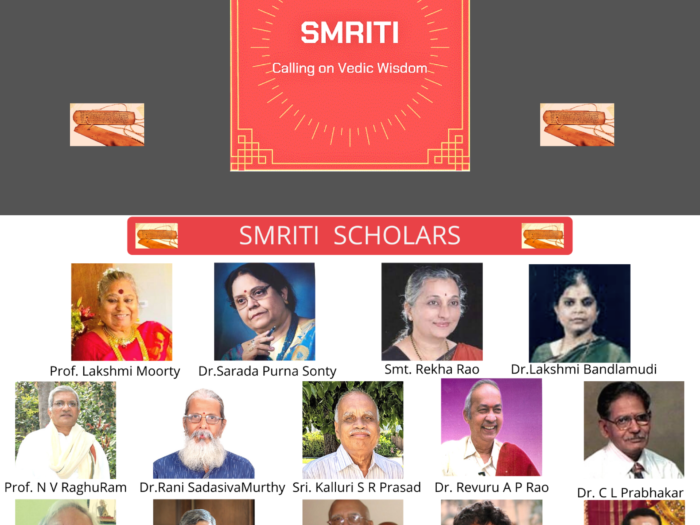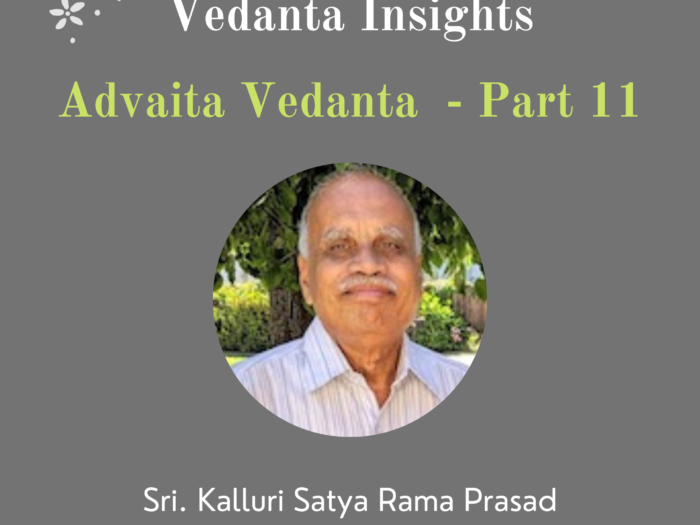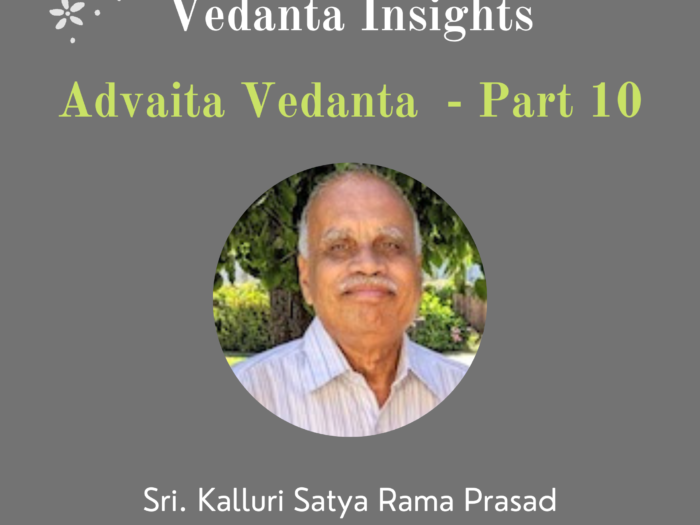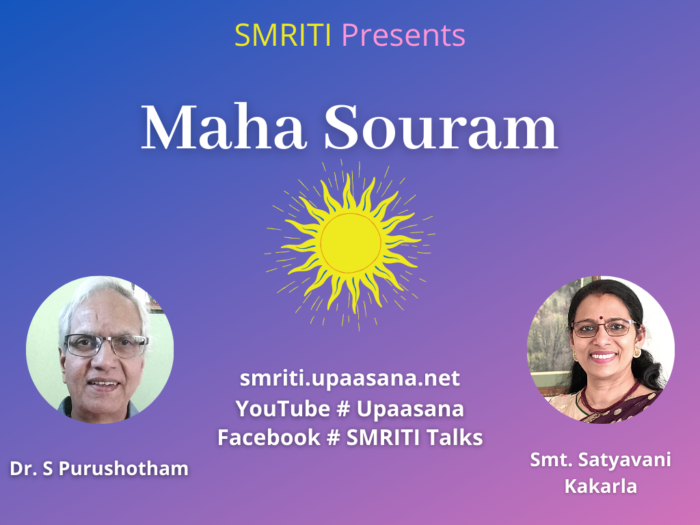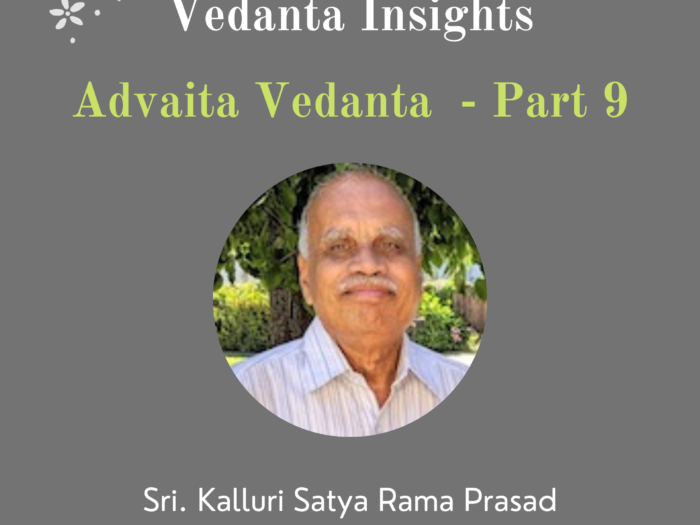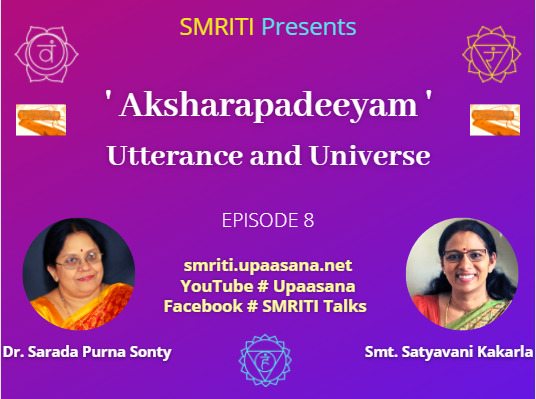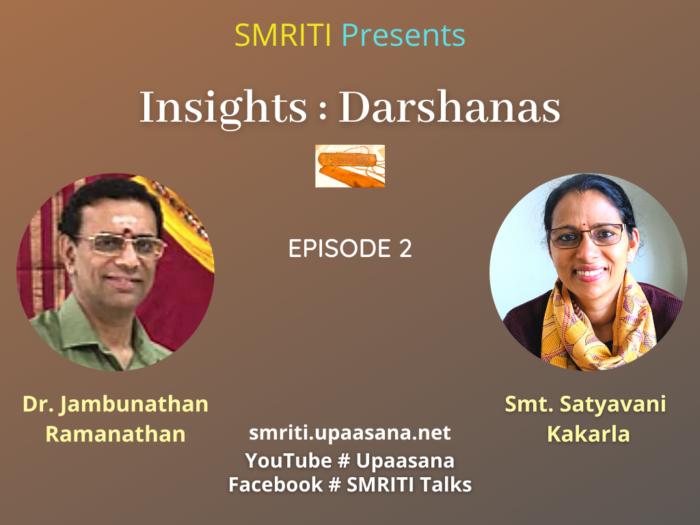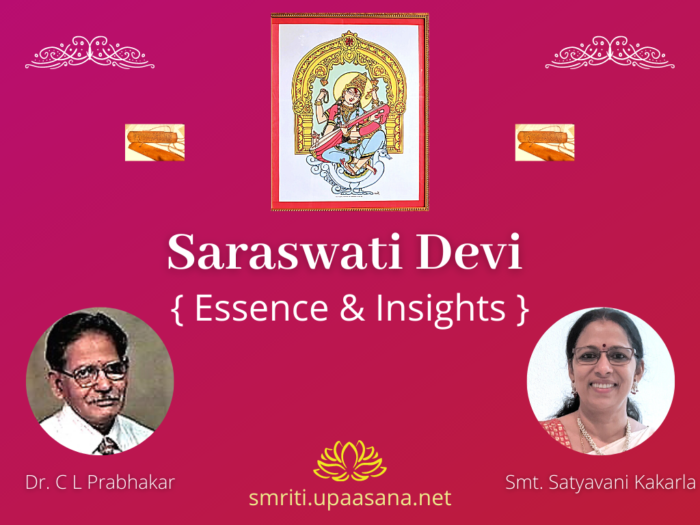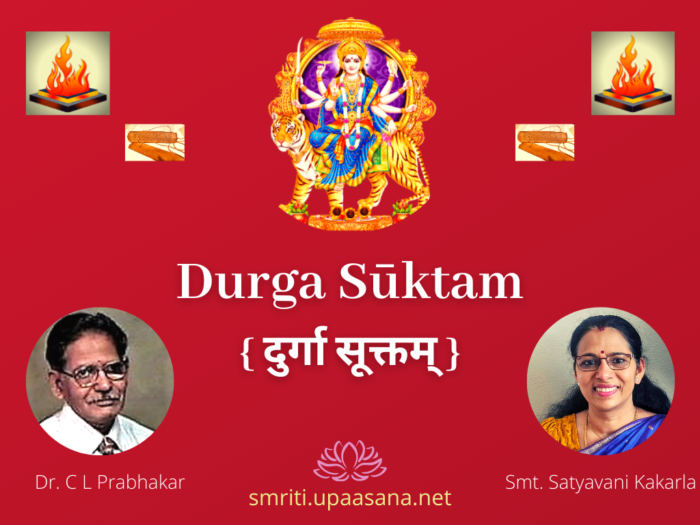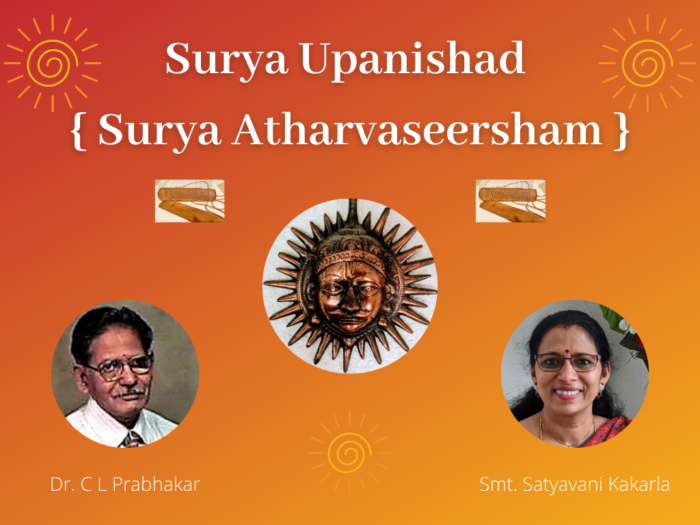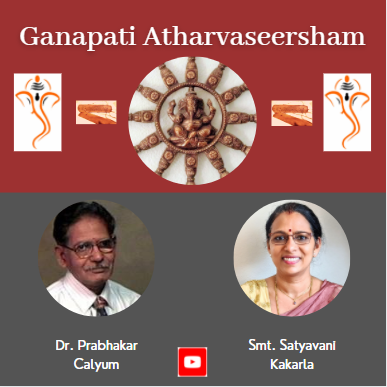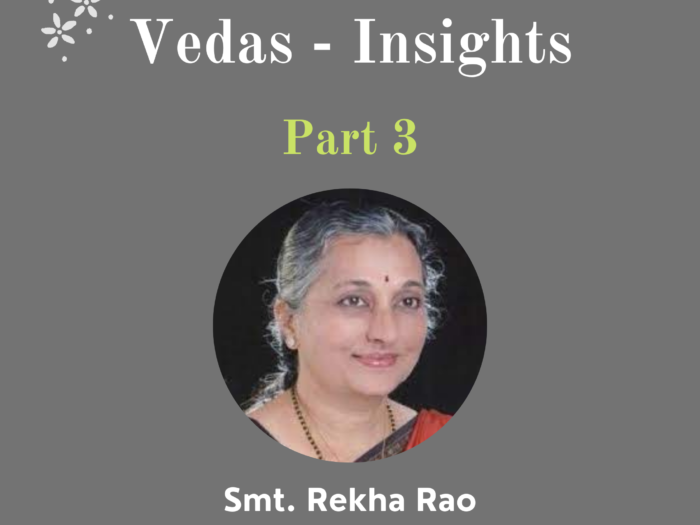📻 Namaste! This is Satyavani Kakarla, founder of Upaasana-SMRITI.Step into the world of timeless wisdom—where…
Exciting News: Announcing > Upaasana-SMRITI : Annual Virtual Summit! Save the Date: January 20th, 2024…
Sincere thanks to all scholars who have pursued a rich life gathering Sanaatana Dharma wisdom…
Every place, being, trees, stones, everything in the Universe has a story to tell. The story has been in continuum from times immemorial. We constantly touch, explore in a process – the Yatra, the journey to know, and the curiosity is always kindled in us.
Definitions (along with explanation) covered in this issue:
“Mahaavaakyam {Great dictum/Declaration}”; “Vritti {Mental Modification/ Dispostion}”; “Shravanam {Listening}; “Mananam {Cogitation/Contemplation}”; “Nidi-dhyaasanam {Unbroken Mediatation}”; “Abhaavanaa {Ignorance of Reality}, Asambhaavanaa {Doubting the Reality} & Vipareeta-bhaavanaa {Contrary concept of Reality}”
Vedanta always looked at human beings as a complex personality. At the grossest level as the body and limbs and at the subtlest level as Consciousness, the Self; in-between, the manifestations, the whole idea of Mind as an integral part of being, we have the mind and mind related activities that is intellect, memory… recollection, analysis, and the Prana which is supposed to be supporting the whole bodily activities.
Nyaya in medieval times, history of Nyaya Shastra, the enriched knowledge of logic and analysis.
Definitions (along with explanation) covered in this issue:
“Samhitaa {Compiled Mantra-s}”; “Braahmanam {Procedures for conducting Rituals}”; “Aaranyakam {Section pertaining to Subjective Mental Worship}”; “Upanishad {Highest Philosophical Knowledge}”; “Brahma-sootraani {Aphorisms related to Brahman}”; “Bhagavad-geetaa {Divine Song}”; “Vedaantah {Highest Philosophical Knowledge}”; “Prasthaana-trayee {Triad of ‘Sources of Authority’}
Maha Souram is a collection of 65 mantras carefully selected from various parts of Rigveda, all of which either extol Sun God and / or seek His grace for a powerful and energetic life.
Basically in Sanskrit and texts we have 3 different terms we use for happiness – “Sukham, Ananda, Santosha”, almost similar that they are.
In Vedic texts, Agni is a major and often invoked God. Agni Devata remains an integral part of Vedic Sanatana Dharma traditions, a witness -Agni Sakshi.
Watch Video for more insights on Agni Devata from verses in Agni Suktam…
Definitions, along with explanation covered in this issue:
“Abhaavah (Absence/Non-existence)”; “Pramaanam (Sacred Authority/Standard/ Means of Knowledge); “Triputi (Triad)”;
“Mantrah (Hymn/Formula for sacred prayer)”; “Vedah (Sacred knowledge)”
Yoga : Myths & Misconceptions!
Yoga, what is it really? Watch Sri. N V Raghuram unravel the myths and misconceptions that has pervaded past decades as he clarifies and brings light on true and best practices for better and meaningful Yoga Sadhana.
Watch on…
Life is Precious. Time is precious. But life is more precious than time. It is so because life is short and time is an ever-flow like Mahanadi. ‘Ayush’ the life span is most precious and hence we have the instruction: ‘Anushasca kanasascaiva vidyamartham ca sadhayet.. ‘. Vidya and sense and supporting wealth have to be acquired on installments constantly.
Watch the video and now more about Ayushya Suktam…
“Akshara : is the primordial principle at the origin of every thing that manifest with many dimensions.
Akshara is finite, immense, expansive and beyond yet is subservient to ‘Atman’ .
Akshara is the womb of the Universe.
Akshara belongs to two 2 worlds – created & non-created, manifest and un-manifest.
Akshara has unique mediatory capacity, mediation ability.”
In the previous episode, classification of scriptures and introduction to Nyaya and Mimamsa knowledge was shared…
This episode covers more in depth insights on Darshanas and Shad Darshanas, the six well-known systems of Indian philosophy – Nyaya, Vaiseshika, Samkhya, Yoga, Mimamsa and Vedanta. All these texts explore the Vedas; what is read and heard and what direction they point us to.
Veda-s is not our past, it is the present, it is the future as well.
Today we are not traveling back to Vedic times where time space concepts don’t exist . We are going to stand firmly on ground, in present, as being, make an effort to understand the difference ‘ if any ‘.
Goddess Saraswati Devi’s blessings is most important to all. She is ‘VaagDevi,’ Goddess of speech.…
Devi Suktam { देवी सूक्तम् } is from the 10 Mandala of Rig Veda and is the 125th suktam. It has 8 mantras – 7 mantras are in trishtup and 1 in jagati metres. Information on Devi is also found in the13th chapter of Durga Saptasathi.
Devi Suktam was revealed to a female rishi – Vak, daughter of Ambrini Rishi, hence her name Vaagabhrini is the rishika. In this suktam, the Devata is Devi – Vaagdevi. This suktam is also called Vaak Suktam.
Durgā Sūktam is a prayer to Goddess Durga Devi. Adi Shakthi, Durga Parameswari is embodiment of power.
She is the primordial energy, a form of Agni, the fire force. Durga means unassailable, cannot be defeated by anybody, protective, shock absorber, rids of troubles.
The hymns recitation brings good vibrations and peace. Enhances vitality and valor dispelling fears.
Durga Suktam can be found in Durga Saptashati, in Rig Veda suktas of 1st Mandala and in MahaNarayana Upanishad. It is also a SriVidya Upaasana.
Watch and listen to conversation with Dr. Sarada Purna Sonty as she shares her personal story, a journey, bringing valuable insights from Vedic world and wisdom.
SMRITI project is on a mission to curate our timeless, ageless Vedic, Vedantic wisdom. Stories play a big part in tapping into our treasures of knowledge.
Narayana Upanishad {Narayana Atharvaseersham(Atharvasirsha)} is the 18th among the well known 108 Upanishads. A short Upanishad, it was revealed by great seer Atharva Rishi. The powerful Narayana Ashtakshari Mantra or simply called Narayana Mantra is embedded in this Upanishad.
What makes the modern scientific worldview different from traditional speculative world view?
The age old Vedic wisdom, system and philosophy still stands tall and glaring .
“सुर्योपनिषत्” Surya Upanishad / Surya Atharvaseersham, is one among the 5 Atharvaseershas coming from Vedas.
Worship of Sun God, Surya, has been practiced since Vedic times.
The hymns in the Surya Atharvaseersha belong to Atharva Veda, and are in praise of the Sun. Surya Atharvaseersha is also called Atharvaangirasah Vidya and Saavitri Vidya; revealed to us by two great Rishis – Atharva and Angirasa.
Watch for more insights and in depth explanation of Surya Bhagavan and the verses…
‘Atharva’ means pain-free; ‘Seersha’ means prime, the most important. The most important vidya/knowledge of all Vidyas that gives all round success, all round happiness, removes all sorts of obstacles, and is beneficial in all ways is the Ganesha Vidya – “ Ganesha Aatharvaseersham.”
On reciting “Ganapati Atharvaseesrham,” one is blessed and receives and dwells in pure happiness – ‘Anandaanubhava.’
Samaṣṭi (समष्टि) : The Connect – Forging Pathways from Sanatana Dharma to Human Excellence and Well-Being …
2. The VedasVedas, the oldest liturgical sacred texts which formed the basis of Vedic religion…



